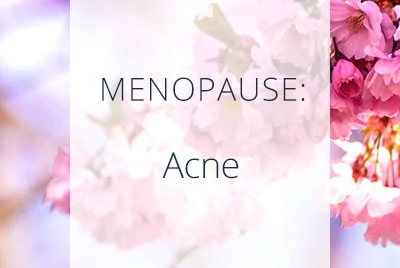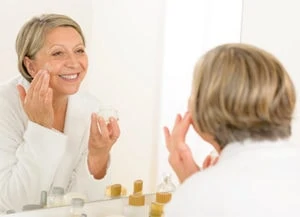Perimenopausal Acne, causes and treatment options

There is no denying that the skin changes during menopause can be both uncomfortable and distressing. Hormonal changes, stress, genetics, just to name a few, are possible culprits. It is usually hard to narrow down acne to a single cause.
Perimenopausal Acne develops in women for much the same reasons that it curses our years in puberty. The changes and imbalances in hormone levels during this stage of life impact our skin’s natural defenses and trigger acne.
In most cases, adult acne is caused by hormonal imbalances in which the body produces too much androgen (male sex hormones), or increased sensitivity to normal levels of androgen at the level of the skin. In addition, anything that compromises the immune system, whether it is emotional stress or nutritional deficiency, is likely to upset your cortisol and insulin balance, which can affect your skin, as well. For some women, it may also be responsible for a deepening of the voice and the appearance of facial hair.
Menopause often comes with a plethora of skin changes. Sometimes, these changes include acne. It doesn’t seem fair to have to battle pimples, wrinkles, and menopause symptoms at the same time, but please know that you are not alone.
Acne in perimenopausal women is rarely severe enough to warrant medical treatment, and once your hormones balance out, the acne usually disappears.
Estrogen is a powerhouse hormone. It stimulates the maturation of a girl’s body at puberty. It helps keep a woman’s bones strong. The decline of estrogen levels during this stage of a woman’s life may affect skin change.
Another thing estrogen does is stimulate the formation of skin-smoothing collagen and oils. That’s why, as menopause approaches and estrogen production diminishes, dry skin, and at times itchy, become very common.
Menopausal Acne Treatment
If you are concerned about acne and are looking for a way to clear it up, good hygiene and over-the-counter treatments should help.
At home and over the counter treatment options for perimenopausal acne include:
- Wash the face daily. with a mild soap that won’t dry your skin out, and moisturize with facial cream or lotion. Try not to scrub too hard when exfoliating; this may irritate your skin. For mature skin, soap can be too drying. And you definitely want to skip the deodorant bars.
- Wash acne-prone skin with a cleanser that contains salicylic acid. This helps unclog pores.
- Use a topical anti-microbial or benzoyl peroxide to cleanse the face.
- No picking or popping. These practices, while tempting, may make the problem worse or cause scarring.
- Avoid tanning, and apply sunscreen to the face when spending time outdoors.
- Replace old cosmetics. Avoid oil-based cosmetics and choose mineral or water-based products. Wash your face of makeup daily before going to bed.
Natural treatments are usually free of the side effects sometimes caused by prescription options. But they may not be as effective. For stronger acne treatments, you are welcome to schedule an appointment with me or a dermatologist to discuss prescription options.
For stronger acne treatments, you are welcome to schedule an appointment with me or a dermatologist to discuss prescription options.
Prescription treatment options for perimenopausal acne include:
Prescription antibiotics like Benzamycin could do the trick, as well as blackhead treatments like Retinoids (a derivative of Vitamin A). Consider using a skincare product that contains retinol or peptides. When using Retinoids, be sure to apply plenty of sunscreen daily, as they are notorious for increasing the skin’s sensitivity to UV rays. Retinoids help your skin slough off dead skin cells at a more normal rate so the dead skin cells don’t bind together and clog your pores.
- Oral medications. Your doctor may prescribe antibiotics, androgen blockers like spironolactone, or a low dosage of severe acne medication such as Accutane.
- Hormone Replacement Therapy (HRT). The most effective treatment for adult acne is usually some form of hormonal therapy. For menopausal women, this means Hormone Replacement Therapy. Some women who start HRT report that their complexion has cleared up, while others find that it’s made their acne troubles worse. HRT can relieve many unpleasant symptoms of menopause, but there are some risks with starting HRT, mostly for women who have a history of breast or endometrial cancers. Most likely, your medical professionals wouldn’t prescribe HRT for skin troubles alone but may prescribe it if you’re suffering from a host of problems related to menopause.
Acne is a very normal, common experience for perimenopausal women. If you choose to make an appointment with us, please come prepared with any and all questions and concerns you might have about skincare. Take note of your symptoms and problem areas and be prepared to talk about what products and cleansing practices you’re currently using.
If you believe you are experiencing symptoms of, or suffering from Perimenopausal Acne, or have questions about it, please see your doctor.
We also invite you to establish care with Dr. Aliabadi. Please click here to make an appointment or call us at (844) 863-6700.
















